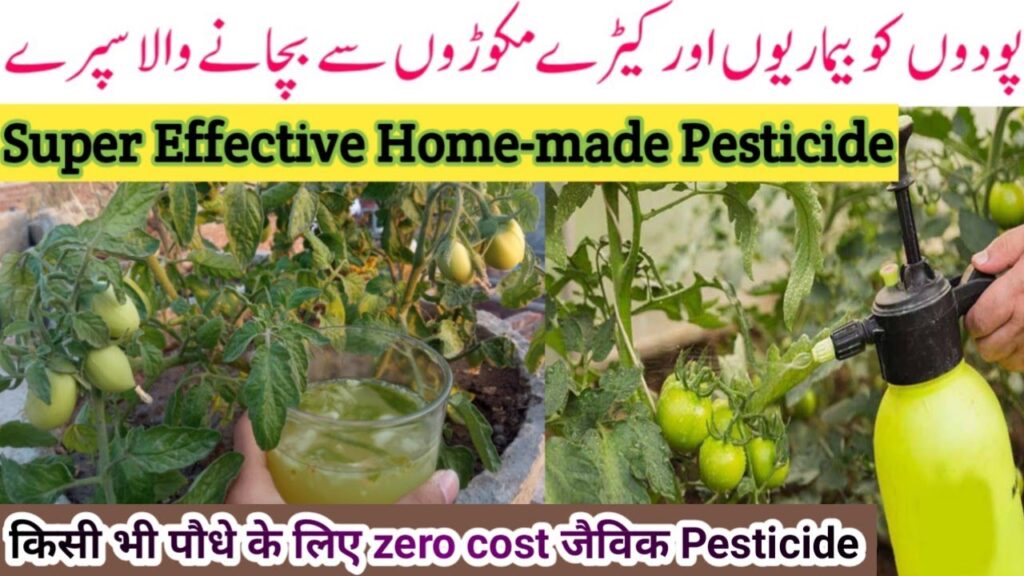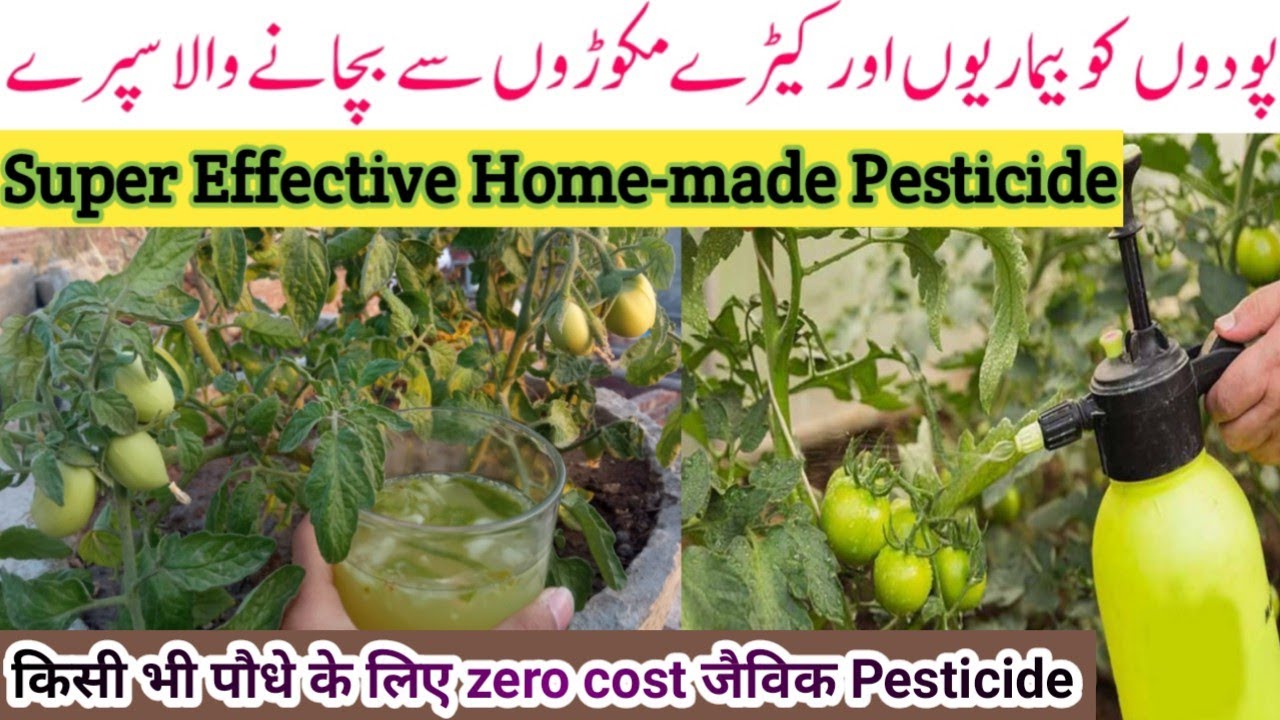
Homemade Organic Pesticides for Vegetable Gardens: A Comprehensive Guide
Protecting your vegetable garden from pests doesn’t have to involve harsh chemicals. In fact, creating homemade organic pesticides is a viable and often more effective solution. These natural alternatives not only safeguard your plants but also ensure the safety of beneficial insects, your family, and the environment. This guide will delve into the world of homemade organic pesticides, providing you with practical recipes, application techniques, and valuable insights for maintaining a thriving, pest-free vegetable garden.
Why Choose Homemade Organic Pesticides?
The allure of homemade organic pesticides lies in their numerous advantages over synthetic counterparts. Firstly, they’re typically less toxic to humans, pets, and beneficial insects like bees and ladybugs. Synthetic pesticides can have broad-spectrum effects, harming even the creatures that help control pests naturally. Secondly, homemade organic pesticides are often more cost-effective, utilizing readily available ingredients from your kitchen or garden. Thirdly, using homemade organic pesticides reduces your garden’s exposure to harmful chemicals, leading to healthier produce and a more sustainable gardening practice.
Understanding Common Garden Pests
Before diving into recipes, it’s crucial to identify the common pests plaguing your vegetable garden. Aphids, cabbage worms, spider mites, and slugs are frequent offenders. Each pest requires a specific approach, and understanding their behavior will help you choose the most effective homemade organic pesticide.
- Aphids: Tiny, sap-sucking insects that cluster on stems and leaves.
- Cabbage Worms: Green caterpillars that devour cabbage, broccoli, and other leafy greens.
- Spider Mites: Microscopic pests that create webs and suck sap, causing leaves to yellow and dry.
- Slugs: Slimy creatures that feed on leaves and vegetables, leaving irregular holes.
Effective Homemade Organic Pesticide Recipes
Now, let’s explore some tried-and-true recipes for homemade organic pesticides. Remember to test any pesticide on a small area of your plant before applying it broadly to ensure it doesn’t cause any adverse reactions.
Garlic Spray
Garlic’s pungent aroma is a natural deterrent for many pests. To make garlic spray:
- Crush 4-5 cloves of garlic.
- Soak the crushed garlic in 2 cups of water for 24 hours.
- Strain the mixture and add a teaspoon of liquid dish soap (ensure it’s free of bleach or additives).
- Dilute the concentrate with 2 quarts of water.
- Spray liberally on affected plants.
Neem Oil Spray
Neem oil is a broad-spectrum insecticide and fungicide derived from the neem tree. It disrupts the feeding and reproduction of many pests. To make neem oil spray:
- Mix 2 tablespoons of neem oil with 1 teaspoon of liquid dish soap in a gallon of water.
- Shake well to emulsify the oil.
- Spray on plants, ensuring thorough coverage, especially under leaves.
Insecticidal Soap
Insecticidal soap is effective against soft-bodied insects like aphids, spider mites, and whiteflies. You can purchase pre-made insecticidal soap, but it’s also easy to make at home:
- Mix 1-2 tablespoons of liquid dish soap (again, avoid those with bleach or additives) in a gallon of water.
- Spray directly on pests, ensuring contact.
- Repeat applications may be necessary.
Diatomaceous Earth (DE)
Diatomaceous earth is a powder made from fossilized diatoms. It’s abrasive to insects’ exoskeletons, causing them to dehydrate and die. Use food-grade DE in your garden.
- Sprinkle DE around plants, especially at the base.
- Reapply after rain.
- Be careful not to inhale the dust.
Pepper Spray
The capsaicin in peppers is a powerful irritant to many pests. To make pepper spray:
- Mix 1 tablespoon of hot pepper sauce or powder with 1 quart of water.
- Add a few drops of liquid dish soap.
- Spray on affected plants.
- Wear gloves and eye protection when handling pepper spray.
Companion Planting
While not a pesticide in the traditional sense, companion planting is a natural way to deter pests. Certain plants repel insects or attract beneficial predators. For example:
- Marigolds repel nematodes and other pests.
- Basil repels aphids and whiteflies.
- Dill attracts beneficial insects like ladybugs and lacewings.
Application Techniques for Homemade Organic Pesticides
The effectiveness of homemade organic pesticides depends not only on the recipe but also on the application technique. Here are some tips:
- Timing: Apply pesticides in the early morning or late evening to avoid harming beneficial insects that are active during the day. Avoid spraying during hot, sunny weather, as it can scorch leaves.
- Coverage: Ensure thorough coverage, especially on the undersides of leaves where many pests hide.
- Frequency: Reapply pesticides regularly, especially after rain or heavy watering. Most homemade organic pesticides break down quickly and need to be reapplied every 7-10 days, or more frequently if pest pressure is high.
- Testing: Always test a small area of the plant before applying the pesticide broadly to ensure it doesn’t cause any damage.
- Rotation: Rotate different types of homemade organic pesticides to prevent pests from developing resistance.
Preventive Measures for a Pest-Free Garden
Prevention is always better than cure. Implementing these preventive measures can significantly reduce the need for pesticides:
- Healthy Soil: Healthy plants are more resistant to pests and diseases. Ensure your soil is rich in organic matter and well-drained. [See also: Composting for Beginners]
- Crop Rotation: Rotate your crops each year to prevent pests from building up in the soil.
- Good Sanitation: Remove dead leaves and plant debris, which can harbor pests and diseases.
- Watering Practices: Water plants at the base to avoid creating a humid environment that encourages fungal diseases and attracts pests.
- Regular Inspection: Regularly inspect your plants for signs of pests or diseases. Early detection allows you to take action before the problem becomes severe.
- Attract Beneficial Insects: Plant flowers and herbs that attract beneficial insects like ladybugs, lacewings, and parasitic wasps. These insects will prey on garden pests.
Troubleshooting Common Problems
Even with the best efforts, you may encounter challenges when using homemade organic pesticides. Here are some common problems and solutions:
- Pesticide Not Effective: If a pesticide isn’t working, try a different recipe or increase the concentration. Ensure you’re applying the pesticide correctly and frequently enough.
- Plant Damage: If a pesticide is damaging your plants, dilute it further or discontinue use. Test on a small area before broad application.
- Pest Resistance: Rotate different types of homemade organic pesticides to prevent pests from developing resistance.
Safety Precautions When Using Homemade Organic Pesticides
While homemade organic pesticides are generally safer than synthetic ones, it’s still important to take precautions:
- Wear Protective Gear: Wear gloves, eye protection, and a mask when mixing and applying pesticides.
- Wash Hands: Wash your hands thoroughly after handling pesticides.
- Store Properly: Store pesticides in clearly labeled containers out of reach of children and pets.
- Avoid Contamination: Avoid contaminating food or water sources with pesticides.
The Future of Organic Pest Control
The movement toward sustainable gardening practices is growing, and homemade organic pesticides are playing an increasingly important role. As research continues, we can expect to see even more innovative and effective natural pest control solutions emerge. By embracing these methods, we can create healthier gardens, protect our environment, and enjoy the fruits (and vegetables) of our labor.
Conclusion
Using homemade organic pesticides for your vegetable garden is a rewarding and sustainable approach to pest control. By understanding common pests, utilizing effective recipes, and implementing preventive measures, you can create a thriving garden without relying on harmful chemicals. Embrace the power of nature and enjoy the benefits of a healthy, pest-free vegetable garden. Remember to always research and adapt the recipes and techniques to your specific garden needs and local pest pressures. With a little experimentation and dedication, you can successfully protect your plants and reap the rewards of a bountiful harvest.

